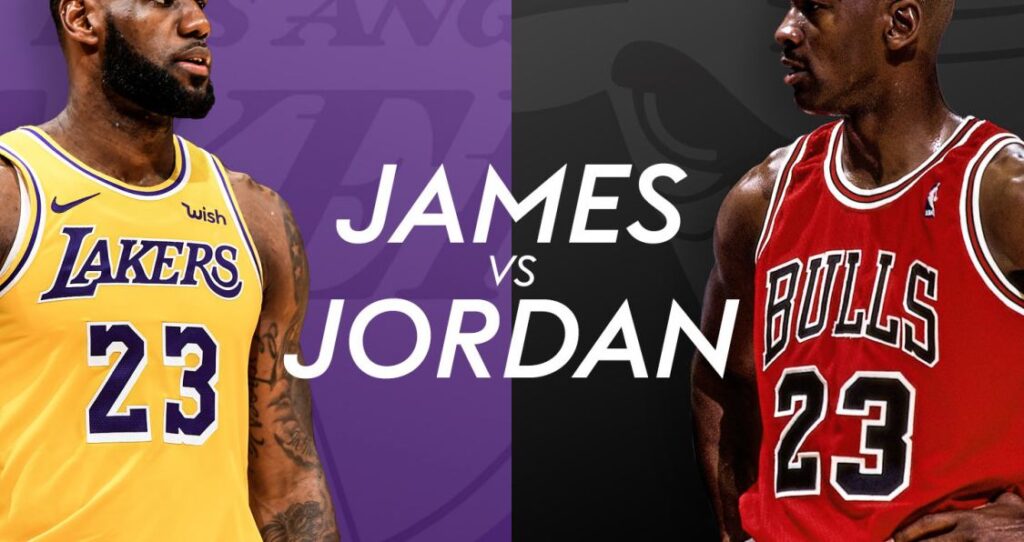
LeBron James, one of the most iconic figures in basketball, has often been compared to the legendary Michael Jordan. From the moment LeBron entered the NBA, the comparisons were inevitable, as fans and analysts debated whether the young phenom could eventually surpass Jordan’s legacy. While LeBron has always expressed deep respect for Jordan, recent revelations suggest that early in his career, LeBron was driven by a desire to overshadow the basketball legend.
### The Shadow of Greatness
When LeBron James was drafted first overall by the Cleveland Cavaliers in 2003, he was already hailed as “The Chosen One” and seen as the next great hope for the NBA. His high school games were nationally televised, and he was dubbed the heir apparent to Michael Jordan, whose influence on the game was still fresh following his final retirement from the NBA in 2003. LeBron embraced the comparisons, knowing that to be the best, he would need to eclipse the legacy of the greatest.
In interviews during his rookie season, LeBron spoke openly about his admiration for Jordan. He wore the number 23 in honor of MJ, but behind the scenes, there was a fire burning within him—a determination to not just emulate Jordan, but to surpass him. LeBron knew that to cement his place in history, he would need to do more than win championships; he would need to redefine the game in a way that even Jordan had not.
### The Drive to Surpass
Throughout his early years in the league, LeBron’s focus on building his own legacy became evident. He was aware that every move he made, every milestone he achieved, would be measured against Jordan’s towering achievements. The desire to overshadow Jordan pushed LeBron to elevate his game, honing his skills, expanding his versatility, and developing into a dominant force on both ends of the court.
However, as LeBron’s career progressed, it became clear that simply winning wasn’t enough to eclipse Jordan. MJ’s six NBA championships with the Chicago Bulls, his five MVP awards, and his clutch performances in the Finals had set a standard that seemed untouchable. LeBron’s journey would involve its own set of challenges, including his decision to leave Cleveland for Miami in 2010, where he joined forces with Dwyane Wade and Chris Bosh to form a superteam with the Heat.
### The Turning Point
The move to Miami was a critical juncture in LeBron’s career. Critics accused him of taking the easy way out, but for LeBron, it was a necessary step to achieve his goal. He knew that championships were essential to any conversation about surpassing Jordan, and he was willing to face the backlash to make that happen. In Miami, LeBron won two NBA titles and solidified his status as the best player in the world, but the comparisons to Jordan only intensified.
Despite the success, LeBron’s desire to surpass Jordan was not just about winning rings; it was about the totality of his impact on the game. While Jordan was known for his scoring prowess and killer instinct, LeBron wanted to be seen as a more complete player, one who could dominate in every facet of the game—scoring, passing, rebounding, and defense. He wanted to be the player who could lift any team, in any situation, to greatness.
### Embracing His Own Path
As LeBron matured, his perspective began to shift. While the comparisons to Jordan never went away, LeBron started to embrace his own unique path. He realized that his legacy didn’t have to mirror Jordan’s to be significant. By returning to Cleveland in 2014 and delivering the Cavaliers their first NBA championship in 2016, LeBron achieved something Jordan never did—bringing a title to a long-suffering franchise and fulfilling a promise to his hometown.
LeBron’s victory in the 2016 NBA Finals, where the Cavaliers came back from a 3-1 deficit to defeat the 73-win Golden State Warriors, is widely regarded as one of the greatest achievements in NBA history. In that moment, LeBron’s legacy was cemented, not just as a player chasing Jordan’s shadow, but as a transcendent figure in his own right.
### The Legacy Debate
The debate over whether LeBron has overshadowed Jordan continues to this day. Some argue that Jordan’s perfect Finals record (6-0) and unmatched competitive drive make him the undisputed GOAT (Greatest of All Time). Others point to LeBron’s longevity, versatility, and impact both on and off the court as evidence that he has surpassed Jordan’s legacy.
LeBron himself has commented on the comparisons, acknowledging that Jordan set the bar high but also emphasizing that he is focused on his own journey. “I always wanted to be the greatest,” LeBron said in a 2020 interview. “That was my mindset from day one. But as I’ve grown, I’ve realized that greatness isn’t just about championships. It’s about how you lead, how you inspire, and how you make the world better.”
### A Legacy of His Own
Today, LeBron James is considered one of the greatest players in NBA history, regardless of the comparisons to Michael Jordan. His achievements, which include four NBA championships, four MVP awards, and multiple All-Star appearances, speak for themselves. But beyond the accolades, LeBron’s impact on the game and the culture surrounding it is what truly sets him apart.
LeBron has used his platform to advocate for social justice, establish schools for underprivileged children, and empower athletes to take control of their own careers. In this way, he has created a legacy that goes beyond basketball, influencing future generations in ways that even Jordan did not.
In the end, while LeBron may have started his career with the goal of overshadowing Michael Jordan, he has ultimately carved out a legacy that is uniquely his own. The comparisons will never cease, but LeBron’s journey has shown that greatness comes in many forms—and that chasing someone else’s shadow can sometimes lead you to create a light all your own.







